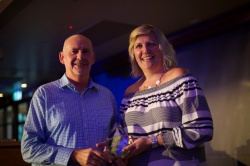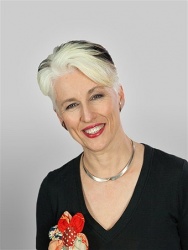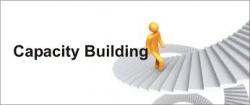
Search archive
2018 AELERT Achievement Awards
27/02/2018

The AELERT Achievement Awards recognise AELERT’s signature values and beliefs: collaboration, leadership, excellence, innovation and improvement in environmental regulation.
This year's Achievement Awards were announced at the 2018 AELERT Conference Dinner in Sydney. For those of you who weren’t there, please join us in congratulating our winners.
The award for Achievement in Building the Regulatory Craft is to celebrate a person or group who has significantly contributed to the regulatory craft. Their contribution should span jurisdictional boundaries.
This year's award was presented to Light Industry Program Partners, WA Department of Water and Environmental Regulation.
The program was created to protect Perth’s Swan and Canning river systems by preventing contaminants such as oil, coolant, paint and pesticides from entering groundwater and stormwater drainage systems from light industrial premises, and in doing so demonstrated achievement in each of the four MRIT themes, and many of the attributes, at a high level.
The project collaborated across local and state governments, involving seven councils and two state agencies.
The program’s focus on capability enhancement in a co-regulatory situation was impressive and yielded an extremely good level of compliance improvement.
One outcome of the program was capacity building in the seven local governments, an important result for developing the regulatory craft. There were impressive reductions in non-compliance rates over the course of the program.
You can read the nomination here.
The award for Achievement in the Regulatory Profession, is to honour a person or group who has excelled or significantly improved in their personal regulatory performance within their home agency.
This year's recipient was Ken Raine, Senior Manager of the Western Australian Pollution Response team of the Department of Water and Environmental Regulation (DWER).
A Pollution Response Unit was initiated by Ken after the Bellevue chemical fire incident in 2001 which caused the WA Government to finance a Pollution/Hazmat response team.
Ken has led the unit for over 14 years and has not lost his commitment, energy or vision to improve pollution response, not only as a job for DWER and the Minister but for the people of WA, to ensure their wellbeing and safety.
The judges felt that Ken Raine displayed not only a level of technical excellence in pollution response, he has displayed leadership qualities by driving knowledge-sharing and capability building across the network.
His nomination described Ken's long-standing commitment to building pollution response capabilities, collaboration, interoperability and response excellence.
Read Ken's nomination here.
Photo: Mark Gifford, AELERT Chair and Germaine Larcombe, WA Jurisdictional Representative accepting award on behalf of winners.
2018 AELERT Conference Wrap Up by Genevieve Jacobs
21/02/2018

Genevieve Jacobs was the Master of Ceremonies at the recent 2018 AELERT Conference in Sydney. With over 30 years of experience as a radio and print journalist, 10 of which were on 666ABC Radio in Canberra, she offered a keen and thoughtful review of the three day conference program. These are her closing remarks.
"Its been a brilliant few days packed with big ideas. That began with Mark Gifford, who urged us to look beyond standard approaches to regulation and ask ourselves the key conference question - “Is being right enough”?
Tim Flannery was a galvanising presence as the opening keynote speaker as he reflected on whether environmental activism was in some sense becoming harder than it used to be amidst the social malaise and declining trust in institutions. He asked us to consider whether this is, in fact, a post truth society - a sobering question for scientists everywhere.
However Flannery believes that ordinary people do have plenty of brains and common sense if we open the discussion with them. He pointed out that the battle over the reality of anthropogenic climate change is all but won, as is that for the value of renewable energy. So how then do we pull the levers at all levels of the community from grassroots to legislation to ensure that the momentum for dealing with climate change continues? Emissions certainly need to be cut hard and fast, but Tim said that we also need to energise the new ideas and new industries that will meet the climate challenge proactively.
That created a starting post for a conference that focussed both on sharing practical ideas and experiences, but also understanding how to effect behavioural change - and you cannot have one without the other. The breakout sessions examined these two ideas through three themes - retrofitting our toolbox, technology and headspace. It seemed to me from these sessions that you are on the cusp of huge challenges and change in your sector. Technology has a great deal to offer you - people are extremely enthusiastic about drones! - but there were also a lot of in depth conversations about the value of intelligence, how to maximise its usefulness to inform rather than only to enforce, and how to marry that with cognitive behavioural understanding.
So Genene O’Neill, for example, asked how to manage a situation where multiple prosecutions have had little effect and some local governments refuse to innovate. Could behavioural insights be a valuable tool for fixing that? Stefan Kauffman and Nicholas Faulkner were considering similar issues, making the point that if you invest time in really understanding the metrics and drivers of a problem, including making sure you’ve assembled the right team to deal with it and ordering your own priorities then you’ll deliver a specifically tailored response where both the communication and engagement reflect what you already thoroughly understand.
Although sometimes when things go badly wrong as they did at Hazelwood in the La Trobe valley, that communication becomes a very tough task when the community feels they’ve lost any control. The same issues pertained in Port Augusta, where the community had little resilience left before they were faced with a major environmental issue. Community unrest and anger - outrage - then gathers around the regulators who carry the blame for a reaction that is about both the issue at hand but also the deep existing problems.
If you don’t understand and can’t communicate with the community, you’re in real trouble. Citizen science can be a solution. At Hazelwood, a co-design project brought the community back through a deliberative process that reaped huge relationship changing results and has been very profitable for working on ongoing issues.
How to carry out that engagement was a major theme. Canadian PR guru Jim Hoggan’s keynote told us emphatically that communications and engagement are central, not an add-on. Sometimes, its every bit as hard as the science or the legislation for several reasons: we are inclined to act tribally, to adjust evidence to suit our own beliefs, and to judge people as good or bad based on whether they agree with us or not. If you add the powerful influence of public relations to these deeply embedded human behaviour patterns, this creates polarisation, disrespect for others and a polluted public space where people increasingly believe that nobody is wholly right and that everyone is acting in their own interests.
In that situation, the facts alone, simply being right, won’t change people’s minds because if they’re not in control they will feel fearful and risk averse no matter what the facts are telling them.
So, what to do? In the words of Buddhist monk Thich Nhat Hanh, how do we “speak the truth but not to punish?”
Jim Hoggan suggested in his workshop that shaping a narrative, personalising it, creating a story that was inclusive and even emotional could be a powerful mechanism for bringing about change in a way that the facts alone could not. People who are emotionally engaged are open to change and new ideas because their trust has been gained.
We saw the power of that storytelling from Natalie Isaacs, formerly a cosmetics manufacturer and now a climate change activist and the founder of One Million Women. She had a personal transformation and then turned that into a catalyst for change in her movement , emphasising that she doesn’t talk about guilt, but empowerment. Natalie says “once you get the message in your heart, it becomes a transformative proposition front and centre. Action on climate change becomes central to your life, not an adjunct to the way we live”.
I understand that this is not easy, and I admire the way in which you are setting yourselves up to face these big challenges for yourselves, your staff and the workplace cultures that you have to bring along with you. But if you can step up to it, then you are very much front line troops in a major battle that affects us all. And on that, I’ve been struck several times throughout the conference that many of you do face a dearth of scientific knowledge in the general community, so the communications become ever more significant
Ben Eggleton looked at some of the exceptionally sophisticated technological tools at your disposal for a range of functions - detecting minute particle ranges for example, but also to make that technology accessible, available and inexpensive. Pragati Shahi and Jack Kinross (speaking from Nepal) talked to us about both the fascinating detail of wildlife conservation around big cat species, in particular the leopard, but also gave us an insight into how social determinants affect conservation across class demographics.
I have so much enjoyed being with you all, I’ve learned a great deal and its made me think that being an environmental regulator might be pretty cool. Thanks you for the opportunity."
AECEN Webinar Series - Status, Sources and Impacts of Air Pollution in Asia Pacific
19/02/2018

Globally, of the estimated 12 million people who die prematurely each year from unhealthy environments, 7 million people die due to air pollution alone. More than two thirds of those deaths occur in the Western Pacific and South East Asian Regions.
To help address this issue, the Asian Environmental Compliance and Enforcement Network (AECEN), is launching a webinar series on pollution control. The first session, “Overview on Status, Sources and Impacts of Air Pollution in Asia Pacific” will be held on 26 February 2018 from 15:00-16:30 (BKK) (GMT+7).
A keynote presentation will be given by Dr. Supat Wangwongwatana, a member of the Climate and Clean Air Coalition’s Scientific Advisory Panel and Former Director General of the Pollution Control Department in Thailand.
To participate in this webinar, please send a message to Chochoe Devaporihartakula, AECEN Programme Manager, at chochoe@iges.or.jp by Thursday, February 22.
For more information, please visit the AECEN website.
AECEN is a INECE partner network.
Tim Flannery Key Note Presentation at the 2018 AELERT Conference
14/02/2018

Tim Flannery opened the 2018 AELERT Conference, "Is being right enough?". He believes that while there is declining trust from the community for NGOs and Government, people tend to believe technical experts. He says "Dont ever doubt that we are right. It is important to defend the environment."
In this keynote, Tim shares with us his thoughts on climate change and where he believes the world needs to focus for a cleaner future.
This video is only available to AELERT Members.
THE SPEAKER
 Tim Flannery is on a mission. He believes that human activity is drastically altering the earth's climate, and that before too long these changes will have a devastating effect on life on this planet. He wants to mobilize the social and political will to address this problem before it's too late.
Tim Flannery is on a mission. He believes that human activity is drastically altering the earth's climate, and that before too long these changes will have a devastating effect on life on this planet. He wants to mobilize the social and political will to address this problem before it's too late.
That's why Tim Flannery wrote The Weather Makers: How Man Is Changing the Climate and What It Means for Life on Earth. In this important and provocative book, which debuted on The New York Times bestseller list, Flannery tells the fascinating story of climate change over millions of years to help us understand the predicament we face today. In authoritative yet accessible language, Flannery carefully lays out the science, demonstrating the substantial, human-induced climate change and the likely ecological effects to the planet if this process continues. He then proposes a game plan to halt, and ultimately reverse, this damaging trend. The Weather Makers has sold over a million copies worldwide, and is proving to be one of the most pivotal and influential texts in our understanding of global warming.
Tim Flannery is the former director of the South Australian Museum, and is currently a professor at Sydney's Macquarie University. He spent a year as professor of Australian studies at Harvard, where he taught in the Department of Organismic and Evolutionary Biology. In 2002, he became the first environmentalist to deliver The Australia Day address to the nation. In 2005 he was honored as Australian Humanist of the Year and, in 2007, he was named Australian of the Year.
A regular contributor to The New York Review of Books and The Times Literary Supplement, Tim also contributes to ABC Radio, NPR and the BBC. In addition, he has also written many books, including, The Future Eaters (1994), The Weathermakers (2005) and Here on Earth (2010), as well as hosted several Documentary Channel specials, such as The Future, and Islands in the Sky.
In 2006 Tim Co-Founded the Copenhagen Climate Council, and chaired the organisation until 2010, advising governments and businesses on environmental policy. He is a member of the Wentworth Group of scientists, became Australia's first chief climate commissioner in 2011 and in 2013 founded the Climate Council to continue communicating authoritative climate change information to the Australian public.
Capacity Building Cluster - Regulatory Officer Capability Framework
06/02/2018

The Capacity Building Cluster has completed their project to develop a universal Capability Framework for Regulatory Officers. It is now available to AELERT members to download from the website.
This framework captures the core capabilities and skill sets required of regulatory officers working in regulatory agencies.
The tool provides regulatory agencies with common language to describe the skills, knowledge and attributes that are critical to building regulatory capability across the various proficiencies.
It allows for greater capacity for professional development through access to common resources, as well as greater mobility for regulatory professionals across the sector by promoting transferrable skills.
The tool is able to be utilised regardless of the regulatory profession. It aims to assist agencies with improved workforce planning and achievement of regulatory objectives. Individual officers can also use it to identify their own training needs in order to achieve career advancement and engage in continuous professional development opportunities.
Five core capabilities were identified, each with underpinning skills sets and behavioural indicators. The skill sets are then divided into five capability levels, from foundational through to highly advanced, reflecting the varying level of knowledge and skills required depending on the role of the regulatory officer. Under this Framework, an officer is expected to possess all behavioural indicators for one capability level before progressing onto the next level, i.e. behavioural indicators have cumulative requirements.
2018 AELERT Conference - Final Speakers Announced
06/02/2018

We are delighted to announce the remaining keynote speakers for the 2018 AELERT Conference:
Tim Flannery
Scientist, explorer and conservationist
Tim Flannery is one of Australia's leading thinkers and writers. A scientist, explorer and conservationist he has published more than 130 peer-reviewed scientific papers and many books. He was described by Sir David Attenborough as one of the great explorers, and as a scientist who's discovered more new species than Charles Darwin. His landmark works The Future Eaters and The Weather Makers have changed the way we think about the environmental challenges facing the world. He spent a year teaching at Harvard, and in 2007 he co-founded and was appointed Chair of the Copenhagen Climate Council. Named Australian of the Year in 2007, he works with governments and business in North America, Asia and Europe on climate change action. In 2011 he became Australia’s Chief Climate Commissioner, and in 2013 he founded and heads the Australian Climate Council. He serves of the Sustainability Advisory Boards of Siemens and Tata Power (India).
Pragati Shahi
Journalist and member of WildTiger Conservation Research and Development
Pragati Shahi is an independent environment writer who has nearly a decade long experience of working with print and digital media at national and international level. During her eight-year journalism career, Pragati has won various awards and fellowships including WWF Media in Conservation Award, Best Environment Reporting Award, South Asia Climate Change Award and British Council Climate Champion. Her features have also appeared in several international media including Time, The Atlantic, Public Broadcasting Service, Broadly, UCANews and Al Jazeera.
Ben Eggleton
Professor of Physics at University of Sydney, co-director of the NSW Smart Sensing Network
Professor Benjamin Eggleton is a Professor of Physics at the University of Sydney, Director of the ARC Centre for Ultrahigh bandwidth Devices for Optical Systems (CUDOS), Director of the Institute of Photonics and Optical Science (IPOS) at the University of Sydney and co-Director of the NSW Smart Sensing Network (NSSN). He was previously an ARC Laureate Fellow and an ARC Federation Fellow twice. He obtained the Ph.D. degree in Physics from the University of Sydney in 1996. Eggleton is a Fellow of the Australian Academy of Science (AA), the Australian Academy of Technology and Engineering (ATSE), the Optical Society of America and IEEE.
You can download the updated conference program here.
Conference Dinner
Date: Wednesday 14 February (Day 1)
Time: 6.30pm-11.30pm
Location: Dockside, Cockle Bay Wharf
Notes: Tickets cost $130.
You will make your own way to and from the dinner.
Join us at the Conference Dinner, held at the beautiful Dockside Function Centre, with views over Darling Harbour and the National Maritime Museum.
You won't want to miss the conference dinner - the entertainment we have lined up with put a smile on your face and a wiggle in your walk!
If you are not already registered for the dinner, click here to add it to your registration. Note that dinner is included in your registration, but you must indicate that you are attending to be allocated a ticket.

